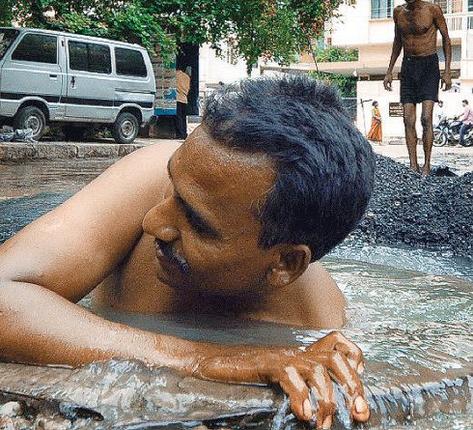New law no relief to manual scavengers
Central law has provisions that only justifies the age-old practice
September 12, 2013
 CHENNAI: There is a law, a court order and a committee. The Centre passed the Prohibition of Employment as Manual Scavengers and their Rehabilitation Bill, 2012 on Saturday.
CHENNAI: There is a law, a court order and a committee. The Centre passed the Prohibition of Employment as Manual Scavengers and their Rehabilitation Bill, 2012 on Saturday.
However, the death of 30 workers in 30 months since February 2012 in Tamil Nadu seems to suggest that nothing is able to prevent the abominable practice.
Most of those who died were workers asphyxiated when they entered septic tanks and sewage systems to remove solid waste dumped into them. Continuous exposure to human waste and hazardous conditions takes a heavy toll on the health of the workers, resulting in premature deaths. Many drink heavily to remain unconscious of the surroundings they are working in.
While the new law has provision for “protective gear” and “safety measures,” CPI MP D. Raja, who moved 30 amendments in the Bill, said these provisions would only serve to continue the practice and for perpetrators to justify the practice of manual scavenging. “Manual scavenging cannot be justified with the provision of so-called protective gear and safety measures,” Mr Raja said.
In Tamil Nadu, a14-member special committee was formed in 2009 following a direction from the Madras High Court in 2008 to suggest measures to eradicate the practice. “On the one hand, the committee is not functioning properly. On the other, the State government has simply failed to act on the suggestions made by the committee when it met in the past. None of the government officials and contractors who have violated the High Court order is punished, mainly because of the indifference of the State government,” said A. Narayanan, editor of Padam magazine, who works closely with the Tamil Nadu Conservancy Workers’ Federation (TNCWF).
While Tamil Nadu is one of the States witnessing rapid urbanization and creation of more and more municipal corporations, the likelihood of deaths due to negligence on the part of officials and private contractors is high. Defecation in open spaces in the absence of toilet facilities has increased the burden of conservancy workers who are made to clear human waste. But they continue to live in pathetic conditions.
“While families of permanent workers of municipalities get some compensation in case of asphyxiation, temporary workers and those employed by private companies and contractors were denied even these benefits,” Mr Narayanan said.
The problem, according to TNCWF office-bearers, lies with the police which appear to be unaware of the 1993 law. “In almost all cases of asphyxiation, FIRs were registered under 174 of the Cr Pc (death under suspicious circumstances). After declaring that the death was caused by asphyxiation, can you classify it as unnatural or suspicious death,” asked R. Ravikumar, the organization’s vice-president.
Among conservancy workers, 50,000 workers employed in panchayats bear the brunt.
“They never get their salaries at the end of the month and they can’t leave the job as there is no guarantee that they will get their dues. The district administration turns a blind eye to their condition,” said M. Sakthivel, co-coordinator of TNCWF.
Source: The Hindu





